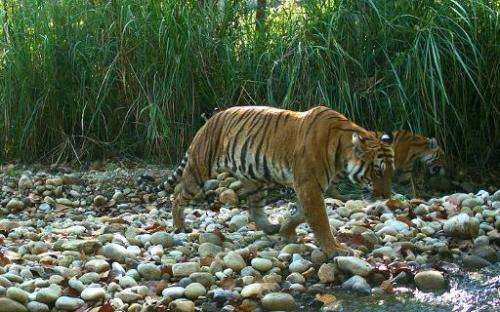'Tiger heavyweight' Nepal hosts anti-poaching summit

Nepal's success in turning tiger-fearing villagers into their protectors has seen none of the endangered cats killed for almost three years, offering key lessons for an anti-poaching summit opening in Kathmandu on Monday.
Experts from conservation group WWF, which is co-hosting the conference with Nepal's government, said the Himalayan nation was a "tiger heavyweight" in the battle to fight poaching and protect them from extinction.
"Nepal and India are our tiger heavyweights leading the region. India excels at recovering tiger numbers and Nepal at zero poaching," said Mike Baltzer of WWF Tigers Alive Initiative.
India in January reported a 30 percent jump in tiger numbers since 2010, while Nepal saw numbers rise almost two thirds between 2009 and 2013. Its last reported poaching incident was in March 2012.
Decades of trafficking and habitat destruction have slashed the global tiger population from 100,000 a century ago to approximately 3,000, according to the International Union for the Conservation of Nature.
Tikaram Adhikari, director general of Nepal's department of national parks and wildlife conservation, said an initiative to convince villagers to inform on poachers and pay them half of tourism revenues had paid huge dividends.

"Earlier, some villagers even protected poachers because they didn't want tigers attacking them. We heard them out, built electric fences, focused on increasing tourism and gave them a big cut of the revenues," Adhikari said.
"Now they know the benefits of protecting tigers and they want to help. The survival of the animal is a matter of prestige for them," he told AFP.
Hundreds of young volunteers act as unofficial guards for Nepal's national parks, home to 198 tigers and 534 rhinos—both listed as critically endangered species by WWF.
A tip-off by local villagers meant police were able to arrest four poachers less than a week after they allegedly killed a tiger in 2012, Adhikari said.
Nepal has twice been recognised for going a full year with no poaching incidents involving tigers or rhinos.
The impoverished country's success in combating wildlife crime sends a clear signal that "anti-poaching cannot be left only to conservationists," WWF Nepal's Diwakar Chapagain said.
"We have to involve people on the ground—volunteers and local law enforcement must have a stake in the process. Otherwise conservation is not sustainable," Chapagain told AFP.
"Spending money and running awareness campaigns is not enough. You need boots on the ground and that's where local communities and law enforcement play an important role in cracking down on poachers," he said.
The five-day anti-poaching summit, which opens Monday evening, will see experts and officials from 13 countries meet to launch an Asia-wide push to fight wildlife crime.
Countries with tiger populations—Bangladesh, Bhutan, China, Cambodia, India, Indonesia, Laos, Malaysia, Myanmar, Nepal, Russia, Thailand and Vietnam—in 2010 launched a plan to double their numbers by 2022.
© 2015 AFP


















